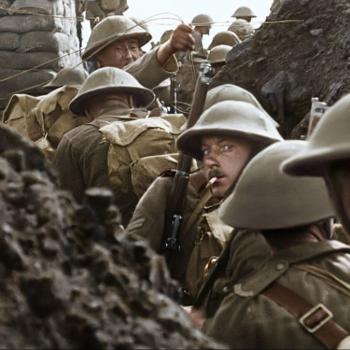I would like to draw your attention to a fascinating and topical essay in the One magazine by Sami El-Yousef, a Christian from Jerusalem. (For those unfamiliar with this little gem of a magazine, One is published by the Catholic Near East Welfare Association). El-Yousef is a Christian (Greek Orthodox) of very ancient stock. He writes lovingly about the Holy Saturday liturgy at the Church of the Holy Sepulchre. As the highlight of the liturgical year, thousands of Christians gather from around the region and pack themselves into this ancient Church for the Holy Fire Celebration. Leading the procession are the 13 oldest Christian families in Jerusalem, and El-Yousef belongs to one of them. These families are given the distinct honor of processing three times around the tomb with their family banners. After the procession, the patriarch enters the tomb and re-emerges with the holy fire.
In the good old says, when Jordan was in control, pilgrims came from as far away as Lebanon, Syria, Egypt and Iraq to experience this night. The city never closed its gates or blocked access. Of course, Israel’s occupation of the city changed things. But even then, Palestinian Christians were generally left in peace to worship on this holiest of nights. But no longer. The gradual erosion of human rights for Palestinians in the occupied territories took a dramatic turn for the worse under the brutal Netanyahu-Liberman regime, for Christians too. Here is El-Yousef:
“This year, despite outcry from church leaders, members of civil society and the Christian community at large, Israeli authorities made it next to impossible to enter the Old City on Holy Saturday. In the early morning hours, police set up roadblocks at all the Old City’s gates and dozens of manned checkpoints along the streets and alleyways leading to the church.”
Even residents of the old city were harassed. The Israelis locked a group of about 70 Christians in their Church and would not let them out (including a number of very frightened elderly people). Residents were only allowed into the Church alongside armed Israeli soldiers. El-Yousef again:
“When we arrived in the church’s courtyard, to our surprise, no one was there to welcome us but a long line of Israeli police officers. Normally, thousands of locals and pilgrims greet us in the courtyard….Once inside the church, we were surprised a second time to be welcomed by only a few worshipers. For as long as I can remember, the church was always filled to capacity, packed with hundreds if not thousands of pilgrims and tourists on Holy Saturday. This year, Israeli authorities prohibited entry to pilgrims so police could access it freely and easily. Has the formula changed? Is the church for worshipers or for the 1,500 police officers (according to Israeli police spokesman Shmuel Ben-Ruby) on the premises that day?
What a strange world we live in. Instead of faithful pilgrims, armed police officers, with guns in plain sight on their waists, welcomed us inside the church on Holy Saturday. Where else on earth do hundreds of armed police officers patrol the inside of a church other than here in the Old City — the holiest of places for Christianity? What an ugly sight indeed.”
This desecration of the holiest Christian shrine somehow escaped the notice of the world media. And the ugliness was not over. For the centuries, the holy fire has been carried to a Greek Orthodox monastery on the roof of the Holy Sepulchre. This year:
“We encountered our third harsh surprise when we reached the church’s roof. For centuries, thousands of Christians from Jerusalem, the Galilee, the West Bank and Gaza gathered on the roof to witness and receive the Holy Fire. They then would march through the streets and alleyways in the Christian Quarter with the fire in hand. This year, there was no enthusiastic crowd of faithful to greet us. In fact, the vast roof was all but empty apart from police barricades and police officers, who directed us immediately off the roof and out of the Greek Orthodox Convent.”
El-Yousef’s final thoughts:
“I look forward to the day when my youngest son, Michael, grows strong enough to carry the banner, and I can pass onto him the honor of carrying it on Holy Saturday. My father passed the honor onto me, and I have already passed it onto my eldest son, Rami. When the days come that I no longer carry the banner, but my sons do so in my place, I will know I have done what I could to keep the tradition and faith alive. Maybe peace will have prevailed in the Holy Land and the celebration will return to how it should be — free.”
Amen. When will the Christians of the United States come to the aid of their suffering brothers and sisters in the occupied territories instead of making common cause with their oppressors?












